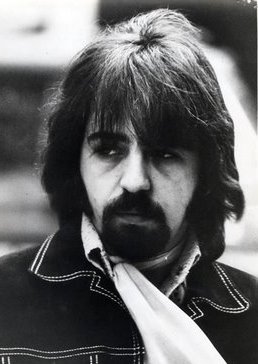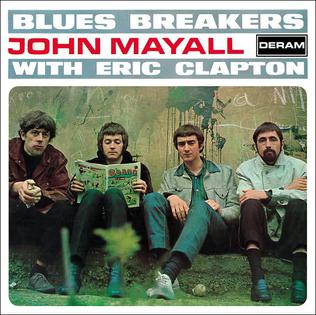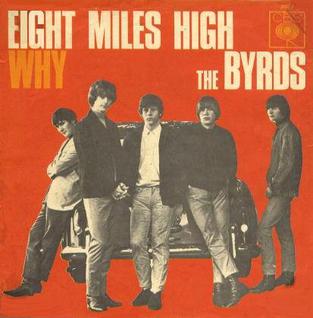
The Byrds were an American rock band formed in Los Angeles, California, in 1964. The band underwent multiple lineup changes throughout its existence, with frontman Roger McGuinn remaining the sole consistent member. Although their time as one of the most popular groups in the world only lasted for a short period in the mid-1960s, the Byrds are considered by critics to be among the most influential rock acts of their era. Their signature blend of clear harmony singing and McGuinn's jangly 12-string Rickenbacker guitar was "absorbed into the vocabulary of rock" and has continued to be influential.

John Brumwell Mayall was an English blues and rock musician, songwriter and producer. In the 1960s, he formed John Mayall & the Bluesbreakers, a band that has counted among its members some of the most famous blues and blues rock musicians. A singer, guitarist, harmonica player, and keyboardist, he had a career that spanned nearly seven decades, remaining an active musician until his death aged 90. Mayall has often been referred to as the "godfather of the British blues", and was inducted into the Rock and Roll Hall of Fame in the musical influence category in 2024.

The Jeff Beck Group was a British rock band formed in London in January 1967 by former Yardbirds guitarist Jeff Beck. Their innovative approach to heavy-sounding blues, rhythm and blues and rock was a major influence on popular music.

Clarence White was an American bluegrass and country guitarist and singer. He is best known as a member of the bluegrass ensemble the Kentucky Colonels and the rock band the Byrds, as well as for being a pioneer of the musical genre of country rock during the late 1960s. White also worked extensively as a session musician, appearing on recordings by the Everly Brothers, Joe Cocker, Ricky Nelson, Pat Boone, the Monkees, Randy Newman, Gene Clark, Linda Ronstadt, Arlo Guthrie, and Jackson Browne among others.

Turn! Turn! Turn! is the second studio album by the American rock band the Byrds, released on December 6, 1965, by Columbia Records. Like its predecessor, Mr. Tambourine Man, the album epitomized the folk rock genre and continued the band's successful mix of vocal harmony and jangly twelve-string Rickenbacker guitar. The album's lead single and title track, "Turn! Turn! Turn!", which was adapted by Pete Seeger from text in the Book of Ecclesiastes, had previously been arranged in a chamber-folk style by the Byrd's lead guitarist Jim McGuinn for folk singer Judy Collins' third album, but the arrangement he used for the Byrds' recording of the song utilizes the same folk-rock style as the band's previous hit singles.

The Byrds' Greatest Hits is the first greatest hits album by the American rock band the Byrds and was released in August 1967 on Columbia Records. It is the top-selling album in the Byrds' catalogue and reached number 6 on the Billboard Top LPs chart, but failed to chart in the UK.

Dr. Byrds & Mr. Hyde is the seventh studio album by the American rock band the Byrds and was released in March 1969 on Columbia Records. The album was produced by Bob Johnston and saw the band juxtaposing country rock material with psychedelic rock, giving the album a stylistic split-personality that was alluded to in its title. It was the first album to feature the new band line-up of Clarence White (guitar), Gene Parsons (drums), John York (bass), and founding member Roger McGuinn (guitar). Dr. Byrds & Mr. Hyde is unique within the band's discography for being the only album on which McGuinn sings the lead vocal on every track.

Farther Along is the eleventh album by the American rock band the Byrds and was released in November 1971 on Columbia Records. For the most part, the album was recorded and produced by the Byrds themselves in London, England, over the course of five work-intensive days in July 1971. It was quickly released as a reaction to the commercial failure of the Byrds' previous album, Byrdmaniax, and as an attempt to stem the criticism that album was receiving in the music press.

The Best of The Byrds: Greatest Hits, Volume II is the third greatest hits album by the American rock band the Byrds, but only the second to be released in the United States, since the earlier The Byrds' Greatest Hits Volume II had only been issued in the UK. The album was released in the U.S. by Columbia Records on November 10, 1972 in lieu of any new Byrds' product during that year. It spent a total of thirteen weeks on the Billboard Top LPs & Tapes chart and peaked at number 114.

Blues Breakers, colloquially known as The Beano Album, is the debut studio album by the English blues rock band John Mayall & the Bluesbreakers, originally credited to John Mayall with Eric Clapton. Produced by Mike Vernon and released in 1966 by Decca Records (UK) and London Records (US), it pioneered a guitar-dominated blues-rock sound.

"Tales of Brave Ulysses" is a song recorded in 1967 by British group Cream. It was released as the B-side to the "Strange Brew" single in June 1967. In November, the song was included on Cream's second album, Disraeli Gears. The song features one of the earliest uses of a wah-wah pedal, which guitarist Eric Clapton plays throughout the song. Cream's song "White Room" copies the chord progression to a large extent.

"SWLABR" is a song recorded by the British rock band Cream in 1967. It first appeared on the album Disraeli Gears (1967). Later, the song was the B-side to Cream's "Sunshine of Your Love" single.

Blues from Laurel Canyon is a 1968 album by John Mayall, featuring British blues music. It was his first album after the breakup of his band the Bluesbreakers in May 1968, although others claim it was on 14 July 1968. It was also his last album with Decca before moving to Polydor.

"5D (Fifth Dimension)" is a song by the American rock band the Byrds, written by band member Jim McGuinn. It was released as a single in June 1966, and also included as the title track on the Byrds' third album, Fifth Dimension.
Alexis Korner's Blues Incorporated, or simply Blues Incorporated, were an English blues band formed in London in 1961, led by Alexis Korner and including at various times Jack Bruce, Charlie Watts, Terry Cox, Ginger Baker, Art Wood, Long John Baldry, Ronnie Jones, Danny Thompson, Graham Bond, Cyril Davies and Dick Heckstall-Smith.
"I'm Your Witchdoctor" is a 1965 single by John Mayall & the Bluesbreakers composed by Mayall, produced by Jimmy Page, and issued on the Immediate label. The exact date or London studio for the recording session has not been determined, but in all likelihood it was recorded at IBC Studios in August 1965 after Page was appointed house producer at Immediate Records. Instead of featuring a regular guitar solo, the recording is characterized by Clapton's overdriven one-note sustain.
The Gass was a rock band formed in May 1965 by Robert Tench, Godfrey McLean, and Errol McLean. They were managed by Rik Gunnell and Active Management. The band fused melodies with soul, Latin influences, blues and progressive rock often employing complex rhythms with an eclectic mix of other influences.
"Triad" is a song written by American singer-songwriter David Crosby in 1967 about a ménage à trois. It was recorded by the Byrds that year, while Crosby was a member of the band, but their version went unreleased at the time and was not issued until twenty years later. Jefferson Airplane released a version of the song in 1968 on their Crown of Creation album and a live version performed by Crosby was included on Crosby, Stills, Nash & Young's 4 Way Street in 1971.

"Why" is a song by the American rock band the Byrds, written by David Crosby and Jim McGuinn and first released as the B-side of the band's "Eight Miles High" single in March 1966. The song was re-recorded in December 1966 and released for a second time as part of the band's Younger Than Yesterday album.
Kevin Daniel Kelley was an American drummer, best known for his work with the rock bands the Byrds and the Rising Sons. Kelley also played drums for Fever Tree, although it is unknown whether he was an official member of the group or not. Kelley is the cousin of country rock pioneer and ex-member of the Byrds and the Flying Burrito Brothers, Chris Hillman.














